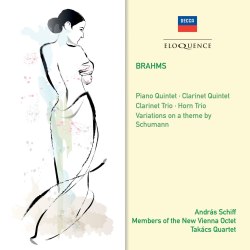|

|
Johannes BRAHMS (1833-1897)
Clarinet Trio in A minor, Op. 114 (1891) [26:06]
Horn Trio in E flat major, Op. 40 (1865) [29:00]
Variations on a Theme of Schumann, Op. 23 (1862) [15:32]
Piano Quintet in F minor, Op. 34 (1862) [41:09]
Clarinet Quintet in B minor, Op. 115 (1891) [36:05]
Peter Schmidl (clarinet)
Günter Högner (horn)
Friedrich Dolezal (cello: Op. 114)
András Schiff (piano: Opp. 23, 34, 40, 114)
Erich Binder (violin: Op. 40)
Sir Georg Solti (piano: Op. 23)
Takács String Quartet (Op. 34)
Members of the New Vienna Octet (Op. 115)
rec. 1-3 November 1982, Sofiensaal, Vienna (Opp. 40, 114), 20-23 April 1988, Konzerthaus, Vienna (Op. 23), 21-23 January 1980, Konzerthaus, Vienna (Op. 34), 3-5 January 1980, Sofiensaal, Vienna (Op. 115)
DECCA ELOQUENCE 4801280 [70:58 + 77:22]
This notable anthology of chamber music by Brahms gathers a host of fine Decca performances from the 1980s. They’re all in very well recorded sound. No 19th century composer after Beethoven had a greater commitment to chamber music than Brahms. These splendid performances bear witness to the excellence of masterpiece after masterpiece.
From a commercial point of view the only drawback to this collection is that it lacks a coherent overall identity. Any collector choosing to acquire it may need to double up on recordings of at least one work, if not more than one. That said, the performances are all distinctive and are well worth obtaining for their own sake.
There are two amply-filled CDs, each containing more than 70 minutes of music. Disc 1 opens with the Clarinet Trio, composed like the famous Quintet for Richard Mülfeld (1856-1907) of the Meiningen Orchestra. The cantabile tone of Peter Schmidl’s clarinet is heard to wonderful effect in the Adagio. There the subtle relationships between the instruments are developed with the utmost sensitivity, creating music of both fantasy and passion. The third movement is an elegant intermezzo, poignantly recalling the world of Brahms’ Liebeslieder waltzes. By cotnrast the finale abounds in rhythmic vitality, vibrantly performed by these players.
The Horn Trio, with its distinctive combination of horn, violin and piano, dates from the first year of the composer’s residence in Vienna. Frequently Brahms chooses to create a mood of lyrical meditation instead of a more conventional thrusting attack. In the process he establishes an ambience of romantic nostalgia that anticipates the style he would favour during his final years. Günter Högner’s horn playing creates just the right atmosphere here, but also leads the way in the more dynamic approach found in the scherzo and finale.
András Schiff is joined by Sir Georg Solti in the Schumann Variations for piano duet. This is probably the least known among the compositions found here. Their performance achieves an overall unity while bringing out the individual characteristics of each variation. This is a work that runs to fifteen minutes’ duration.
The Piano Quintet is one of several chamber compositions by Brahms that are equivalent in scale and scope to his celebrated symphonies. Here Schiff is joined by the Takács Quartet in an eloquent performance. If not seeking the drama of, for example, Peter Frankl with the Lindsay Quintet (ASV CDDCA778) they do achieve a magnificent grasp of the work’s structure. This performance also displays much sensitivity in terms of phrasing and dynamic shading.
Peter Schmidl’s recording of the Clarinet Quintet, with members of the New Vienna Octet, is new to the CD format. In its LP incarnation it was always a version to be reckoned with. The sound, though very full-toned and rich, allows the eloquent sensitivity of the performance to shine through.
Terry Barfoot
 |
 |
|











